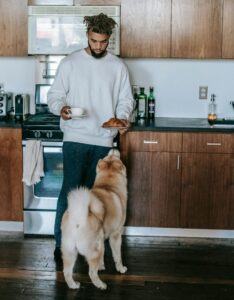Backyard barbecues, picnics, and patio dinners are a summer staple in Kansas. For dog owners, sharing the season with your furry friend is part of the fun. But before you slip your pup a bite of burger or watermelon, it’s important to know which summer foods are safe and which could send you rushing to the vet.
Dogs are curious, especially when delicious smells fill the air. Unfortunately, many popular summer dishes contain ingredients that can cause digestive issues, allergic reactions, or even toxic responses. Let’s explore the safe treats and common hazards so you can include your dog in the summer fun without worry.

Safe Summer Foods for Dogs
Here are some vet-approved foods that are generally safe for dogs in moderation:
1. Watermelon (Seedless)
Watermelon is hydrating and full of vitamins A and C. Be sure to remove all seeds and the rind before serving.
2. Blueberries
These small, antioxidant-rich berries are a perfect training treat or topper for your dog’s meal.
3. Carrots
Raw or cooked, carrots are a crunchy, low-calorie snack that many dogs enjoy.
4. Cucumbers
Packed with water and low in calories, cucumbers make a great cooling snack on hot days.
5. Plain, Grilled Chicken
Avoid seasoning or marinades, but plain grilled chicken is a protein-rich treat.
6. Green Beans
Steamed or raw, green beans are a healthy fiber-filled option.
7. Pumpkin (Plain, Unsweetened)
Pumpkin supports digestion and is especially useful for dogs with sensitive stomachs.
For a full list of fruits and vegetables your dog can and can’t eat, check out this resource from the American Kennel Club.
Summer Foods to Avoid
Some summer foods can cause serious issues if consumed by dogs. Here’s what to keep off their plate:
1. Grapes and Raisins
Even small amounts can lead to kidney failure in dogs. Keep fruit salads and trail mixes out of reach.
2. Onions and Garlic
Common in marinades, dips, and grilled dishes, both are toxic and can cause anemia.
3. Corn on the Cob
While corn itself is not toxic, the cob can cause choking or intestinal blockages.
4. Chocolate and Desserts
Chocolate is toxic to dogs, and sugary desserts often contain xylitol, a sweetener that can be deadly.
5. Alcohol
Even a small amount can cause vomiting, diarrhea, and central nervous system issues.
6. Fatty Meats or Bones
Cooked bones can splinter, and fatty meats can lead to pancreatitis.
Food-Related Training Tips
Food can be a powerful tool in dog training, especially when used strategically. If your dog is joining summer gatherings, use high-value treats like plain chicken or small bits of cheese to reinforce good behavior like staying in place or not begging.
Not sure how to structure food rewards or maintain obedience when guests are around? Our Basic Obedience Training for Reactive Dogs program teaches dogs how to remain calm and responsive even with major distractions like food, noise, or guests.
You can also create training games that incorporate dog-safe treats. These can help satisfy your dog’s mental needs while keeping them engaged away from the picnic table. We explore similar enrichment approaches in our post on smart dog training using escape room techniques.
Feeding Table Scraps: Yes or No?
Feeding table scraps is a slippery slope. If you give your dog food from the table during a meal, you may unintentionally reinforce begging behavior or even encourage food aggression. A better strategy is to serve your dog a healthy treat in their crate or on their designated place away from the dining area.
Training your dog to stay on command during meals creates a calm boundary and reduces the risk of dangerous food exposure.
When to Call the Vet
If your dog consumes something potentially toxic, watch for signs like:
- Vomiting or diarrhea
- Excessive drooling
- Tremors or seizures
- Lethargy or uncoordinated movement
- Loss of appetite
When in doubt, call your vet or a pet poison control hotline immediately. The ASPCA Animal Poison Control Center is available 24/7 at (888) 426-4435.
Final Thoughts
Summer should be about bonding with your dog, not emergency vet visits. By learning what foods are safe and what to avoid, you can enjoy the season with peace of mind. Use safe treats to reinforce good behavior, and always keep potentially harmful items out of reach.
Want to build food control, polite manners, and safe boundaries around distractions? Our trainers can help you develop a plan that suits your lifestyle and your dog’s needs.
Contact us today to get started.
